Every fifth family in Georgia lacks money for food - new NDI study
Georgia NDI Study
According to a new public opinion poll conducted by the NDI (National Democratic Institute), every fifth family in Georgia does not have enough money for food. Also, according to the study, every fifth citizen of Georgia thinks about emigration.
The study was conducted from December 3-20, 2022. Data was collected during face-to-face interviews in the homes of respondents throughout the country (excluding occupied territories). The survey includes a total of 2,519 completed interviews. The average poll error is +/- 1.6 percent.
According to the survey, 18 percent of the population does not have enough money for food.
To the question: “What best describes the economic situation of your family?”, the answers were as follows:
- We have no money for food – 18 percent;
- We only have money for food, but not for clothes – 35 percent;
- We have money for food and clothes, but we cannot afford expensive household items – 36 percent;
- We can afford to buy expensive household items such as a refrigerator or a washing machine – seven percent;
- We can afford to buy everything we need – two percent;
- I don’t know/refuse to answer – two percent.
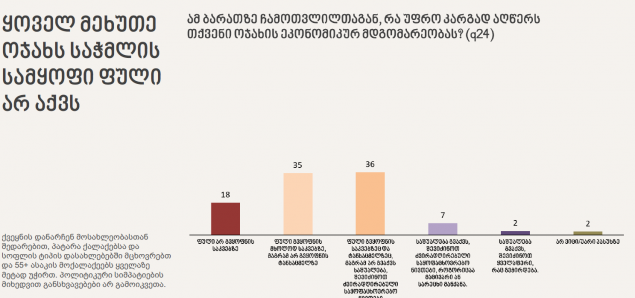
According to the same study, every second person says that in the last six months there was a case when they did not have enough money to pay utility bills.
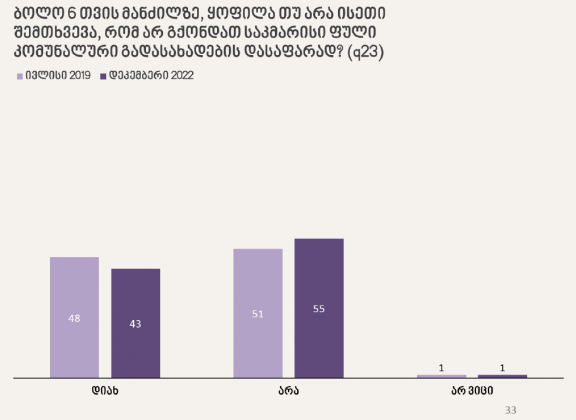
Twenty percent of respondents say they expect to travel abroad for work in the next 12 months, while 76 percent say they “do not expect to” and four percent do not know.
A quarter of the residents of Tbilisi, large cities and ethnic minority settlements, as well as a third of young people, want to emigrate.
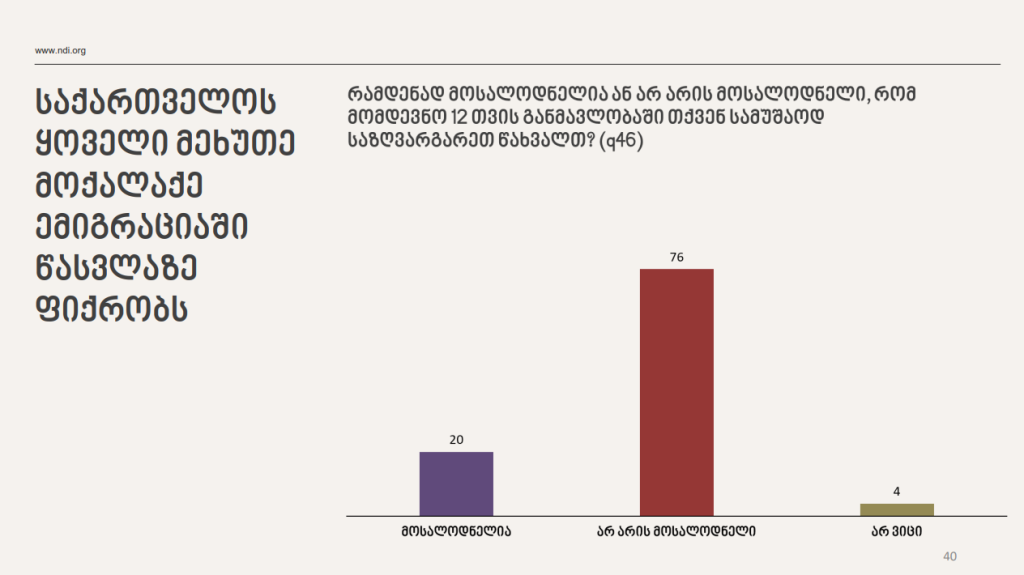
According to the study, rising prices, unemployment and poverty are the most important problems for the population.
- Price increase/inflation – 39 percent,
- Work – 38 percent,
- Poverty – 30 percent,
- Territorial integrity – 25 percent,
- Pensions – 24 percent.
Among ethnic minorities, territorial integrity is not mentioned among the important national issues, but unemployment is also named as the main problem.
Thirty-nine percent of the population has a negative attitude towards the government.
Answers to the question “How would you rate the activities of the current government” were distributed as follows:
- good – 51 percent,
- bad – 39 percent,
- I don’t know – eight percent,
- Refuse to answer – two percent.
32 percent of the population believe the president is doing a bad job, 27 percent believe the prime minister is doing a bad job, and 31 percent believe the parliament is doing a bad job.
To the question “How would you rate the activities of the President, Prime Minister and Parliament?” The answers were distributed as follows:
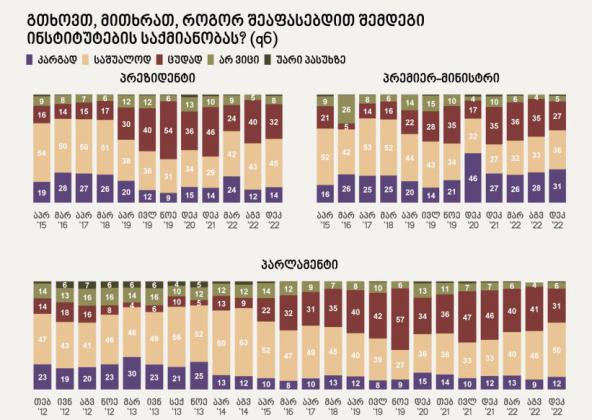
According to the survey, only six percent of citizens consider the economic situation in the country to be good.
Forty-eight percent of the population say the economic situation is bad, 44 percent average, six percent good, and two percent say they don’t know.
The study notes that as of December 2022, fewer people believe that the country’s economy is in bad shape, i.e. the share of “bad” ratings has decreased from 55 to 48 percent.
Tbilisi residents, opposition supporters and swing voters are the most critical of Georgia’s economy.
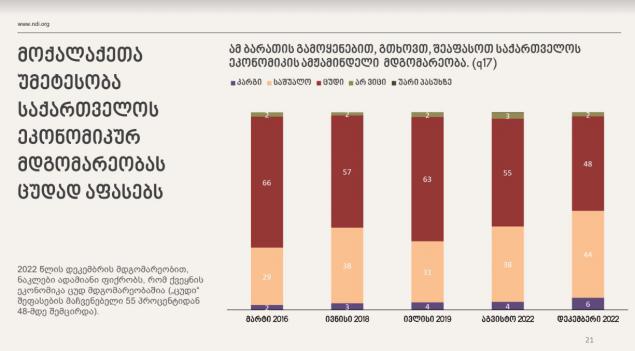
Support for NATO remains consistently high, according to the survey.
To the question “Is the goal of becoming a NATO member declared by the Georgian government acceptable or not?” the answers were distributed as follows:
- acceptable – 73 percent,
- unacceptable – 14 percent,
- I don’t know, 11 percent.
European Union support has increased and returned to its usual level.
For 81 percent of the population it is acceptable that Georgia may become a member of the European Union, for nine percent it is unacceptable, and nine percent do not know.
It is also worth noting that, according to the majority, the government is doing little or nothing to join the EU.
According to the poll, 25 percent of the population say that Georgia has moved away from the European Union over the past five years. Thirty percent of the population believe that over the past five years Georgia has become closer to the EU, while 29 percent believe that relations have not changed, and 15 percent do not know.
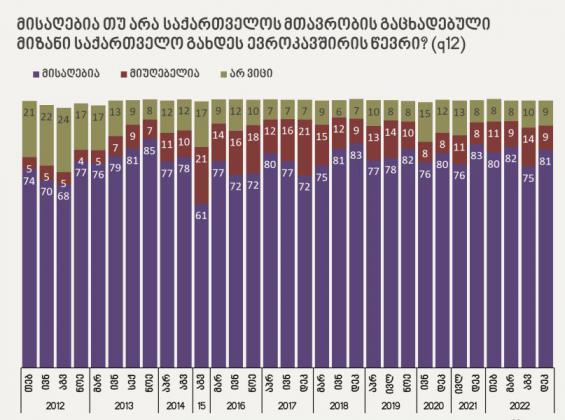
A third of Georgian Dream supporters and nearly half of opposition supporters say neither party represents their interests.
When asked which party is closest to their views, the answers were divided as follows:
- None – 39 percent
- “Georgian Dream” – 25 percent,
- Refusal to answer – 10 percent,
- I don’t know – seven percent,
- “United National Movement” – six percent,
- Other parties – 13 percent.

Georgian citizens have a clear negative attitude towards the Russian government.
To the question “How do you feel about the Russian government in general?” the answers broke downas follows:
- negative – 80 percent,
- positive – 13 percent,
- I don’t know – six percent
- Refusal to answer – two percent.

Unlike the Russian government, the majority of the population has a positive attitude towards the Russian people.
According to the survey, 38 percent of the population have a negative attitude towards Russians, and 56 percent have a positive one.

According to the study, the population of Tbilisi in the age group of 18-34, women and opposition supporters have the most negative attitude towards Russians.

In general, the population of Georgia believes that the Russian government and people are not identical.
Eighty percent of the population has a negative attitude towards the Russian government, and 13 percent towards the people.
At the same time, 69 percent of the Georgian population supports the establishment of a visa policy for Russian citizens. Twenty-one percent say it shouldn’t be introduced, and 10 percent don’t know.
Support for the introduction of a visa policy is higher in Tbilisi, in the age group from 18 to 34, among women and opposition supporters. Residents of ethnic minority settlements do not have a clear position on this issue.
Also, 69 percent believe that the immigration of Russians to Georgia may have a negative impact on the country. Only 17 percent say the impact is positive. At the same time, most ethnic minority communities are counting on the benefits of immigration from Russia.

A quarter of the population does not feel safe in crowded places. For example, every second woman in Tbilisi feels unsafe in crowded places.
In general, 71 percent of men feel safe in crowded places (street, park, transport and subway stops, cafes and restaurants), 24 percent do not feel safe, and among women 53 percent feel safe and 46 percent do not.
“When my child is in kindergarten / school, I am sure that he is safe” – 18 percent of men agree with this statement, six percent disagree. Twenty-one percent of women agree with the same statement, while fourteen percent disagree.





















